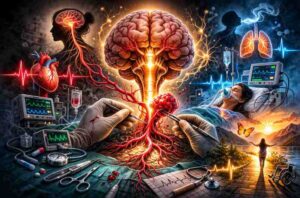Sometimes, the hardest thing to do is to do nothing. This is true for the Queen of England, and neurosurgeons with the latest technology and research at their fingertips
IF this was your father, what would you do?” I asked a few members of my team in an exercise I regularly indulge in to evaluate decision-making.
A 78-year-old previously healthy man had come in with a large hypertensive haemorrhage in his brain that had left him mute and paralysed on his right side. He was in a coma partly because of the location of the bleed, but also because of the pressure it was creating. We could remove the clot and that would probably save his life, but it was unlikely to alter his overall condition. He could be on a ventilator for weeks and discharged home on a tracheostomy, but would still need months, if not years, of 24/7 nursing, continuous physiotherapy, being fed from tubes, and made to pass urine via a catheter – condemned to an existence of meaningless metabolism he would probably never have wanted. If he made a meaningful recovery after all, he would probably still be dependent on others for his daily needs, doomed either way.
“I would do whatever it takes to save him. I can’t live with the guilt of doing nothing, especially if there is a small chance of him making recovery,” appealed the senior resident unequivocally. I turned my eyes to the next person, someone who loves to rattle off numbers, who substantiated, “Literature suggests that in such cases, long-term functional independence is achieved in about 10–30 per cent cases, with mortality rates of 60 per cent at one year. Unfortunately, these numbers do not help me decide.” “It’s easy to make a perfect decision with perfect information. Medicine asks you to make perfect decisions with imperfect information,” I recalled having read an essay by Siddhartha Mukherjee.
I stared into the eyes of the junior-most member of the team. “If this was my father, I would not do anything, just keep him comfortable,” he adjudicated matter-of-factly. “Why?” I queried, ragging him with “is it because you don’t know what to do?” Years of training in medicine makes you tough. And when you’re on the other side and in charge, you need to ask tough questions even when you’re all sailing in the same boat of uncertainty.
“If he passes away, he passes away. If he survives, my family does not have the means to support full-time nursing over a long period. And I’m pretty sure that seeing him like this for months is going to be demoralising for everyone at home, leading to fights, discord, and a perpetual
 state of unpleasantness. He’s led a full life. I don’t think we should mess with nature.”
state of unpleasantness. He’s led a full life. I don’t think we should mess with nature.”
Sometimes the most unassuming people take the most practical decisions, I thought to myself.
“Who are we to decide? Place the data on the table in front of the family, with the pros and cons of each approach, and let them take a call,” proposed another, concluding the discussion.
It is easy for a surgeon to present published data in a manner that goads a patient and their family to make the decision that the surgeon wants them to. You can either speak with
compassion or incite fear, especially if it’s a question of surgery at a time of emergency, when relatives are emotional and unable to think rationally. But it is the surgeon’s responsibility to help them make the decision that’s right for them. In such situations, after I explain things to the patient’s family, I always end the discussion with the golden, reassuring words my mentor used to say: “Whatever decision you take will be the right decision for you and your loved ones.”
Who are doctors to decide who will survive and who won’t… but subconsciously, we make these decisions all the time for patients and their families. What is important when doing so is to keep one’s own biases and opinions aside, and present things in a rational and unemotional way to relatives.
“When there’s no place for a scalpel, words are the surgeon’s only tool.” Paul Kalanithi sighed in his heart-wrenching memoir –When breath becomes air.
It’s the same thing with grade 4 brain cancer. If you don’t carry out any surgical intervention, survival is three to six months. If you operate and offer radiation and chemotherapy, survival can be one to two years. Of course, there are outliers who will survive a little longer, but would you offer the option of surgery to someone who has to sell his land or only cow, and have him exhaust all savings just to have them spend the rest of their lives between home and hospital? Even affluent people who can easily afford the whole works would think twice before opting for expensive and emotionally depleting treatment options that may or may not yield results. It is not our circumstances that make us or decide our fate, but the way we respond to them.“There is nothing good or bad,” as Shakespeare wrote in Hamlet, “but thinking makes it so.”
The relatives of the gentleman with the haemorrhage didn’t opt for any aggressive treatment. He passed away three days later. While that week must have been full of turmoil for them, the son came back a month later to simply say, thank you.




